- Home
- Ian Fleming
The James Bond MEGAPACK® Page 2
The James Bond MEGAPACK® Read online
Page 2
He felt secure and encouraged, had visions of a BEM and made the first payment on a Morris Minor. He also bought a green eye-shade which he had long coveted and which helped him to impose his personality on the picture desk.
Some of this background to his cable passed through Bond’s mind. He was used to oblique control and rather liked it. He felt it feather-bedded him a little, allowed him to give or take an hour or two in his communications with M. He knew that this was probably a fallacy, that probably there was another member of the Service at Royale-les-Eaux who was reporting independently, but it did give the illusion that he wasn’t only 150 miles across the Channel from that deadly office building near Regent’s Park, being watched and judged by those few cold brains that made the whole show work. Just as Fawcett, the Cayman Islander in Kingston, knew that if he bought that Morris Minor outright instead of signing the hire-purchase agreement, someone in London would probably know and want to know where the money had come from.
Bond read the cable twice. He tore a telegram form off the pad on the desk (why give them carbon copies?) and wrote his reply in capital letters:
THANKS INFORMATION SHOULD SUFFICE — BOND
He handed this to the concierge and put the cable signed ‘Dasilva’ in his pocket. The employers (if any) of the concierge could bribe a copy out of the local post office, if the concierge hadn’t already steamed the envelope open or read the cable upside down in Bond’s hands.
He took his key and said good night and turned to the stairs, shaking his head at the liftman. Bond knew what an obliging danger-signal a lift could be. He didn’t expect anyone to be moving on the first floor, but he preferred to be prudent.
Walking quietly up on the balls of his feet, he regretted the hubris of his reply to M via Jamaica. As a gambler he knew it was a mistake to rely on too small a capital. Anyway, M probably wouldn’t let him have any more. He shrugged his shoulders and turned off the stairs into the corridor and walked softly to the door of his room.
Bond knew exactly where the switch was and it was with one flow of motion that he stood on the threshold with the door full open, the light on and a gun in his hand. The safe, empty room sneered at him. He ignored the half-open door of the bathroom and, locking himself in, he turned up the bed-light and the mirror-light and threw his gun on the settee beside the window. Then he bent down and inspected one of his own black hairs which still lay undisturbed where he had left it before dinner, wedged into the drawer of the writing-desk.
Next he examined a faint trace of talcum powder on the inner rim of the porcelain handle of the clothes cupboard. It appeared immaculate. He went into the bathroom, lifted the cover of the lavatory cistern and verified the level of the water against a small scratch on the copper ball-cock.
Doing all this, inspecting these minute burglar-alarms, did not make him feel foolish or self-conscious. He was a secret agent, and still alive thanks to his exact attention to the detail of his profession. Routine precautions were to him no more unreasonable than they would be to a deep-sea diver or a test pilot, or to any man earning danger-money.
Satisfied that his room had not been searched while he was at the casino, Bond undressed and took a cold shower. Then he lit his seventieth cigarette of the day and sat down at the writing-table with the thick wad of his stake money and winnings beside him and entered some figures in a small note-book. Over the two days’ play, he was up exactly three million francs. In London he had been issued with ten million, and he had asked London for a further ten. With this on its way to the local branch of Crédit Lyonnais, his working capital amounted to twenty-three million francs, or some twenty-three thousand pounds.
For a few moments Bond sat motionless, gazing out of the window across the dark sea, then he shoved the bundle of banknotes under the pillow of the ornate single bed, cleaned his teeth, turned out the lights and climbed with relief between the harsh French sheets. For ten minutes he lay on his left side reflecting on the events of the day. Then he turned over and focused his mind towards the tunnel of sleep.
His last action was to slip his right hand under the pillow until it rested under the butt of the ·38 Colt Police Positive with the sawn barrel. Then he slept, and with the warmth and humour of his eyes extinguished, his features relapsed into a taciturn mask, ironical, brutal, and cold.
Chapter 2
Dossier for M
Two weeks before, this memorandum had gone from Station S of the Secret Service to M, who was then and is today head of this adjunct to the British Defence Ministries:
To: M.
From: Head of S.
Subject: A project for the destruction of Monsieur Le Chiffre (alias ‘The Number,’ ‘Herr Nummer,’ ‘Herr Ziffer,’ etc.), one of the Opposition’s chief agents in France and undercover Paymaster of the ‘Syndicat des Ouvriers d’Alsace,’ the Communist-controlled trade union in the heavy and transport industries of Alsace, and as we know, an important fifth column in the event of war with Redland.
Documentation: Head of Archives’ biography of Le Chiffre is attached at Appendix A. Also, Appendix B, a note on Smersh.
We have been feeling for some time that Le Chiffre is getting into deep water. In nearly all respects he is an admirable agent of the USSR, but his gross physical habits and predilections are an Achilles heel of which we have been able to take advantage from time to time and one of his mistresses is a Eurasian (No 1860) controlled by Station F, who has recently been able to obtain insight into his private affairs.
Briefly, it seems that Le Chiffre is on the brink of a financial crisis. Certain straws in the wind were noticed by 1860 — some discreet sales of jewellery, the disposal of a villa at Antibes, and a general tendency to check the loose spending which has always been a feature of his way of life. Further inquiries were made with the help of our friends of the Deuxième Bureau (with whom we have been working jointly on this case) and a curious story has come to light.
In January 1946, Le Chiffre bought control of a chain of brothels, known as the Cordon Jaune, operating in Normandy and Brittany. He was foolish enough to employ for this purpose some fifty million francs of the moneys entrusted to him by Leningrad Section III for the financing of SODA, the trade union mentioned above.
Normally the Cordon Jaune would have proved a most excellent investment and it is possible that Le Chiffre was motivated more by a desire to increase his union funds than by the hope of lining his own pocket by speculating with his employers’ money. However that may be, it is clear that he could have found many investments more savoury than prostitution, if he had not been tempted by the byproduct of unlimited women for his personal use.
Fate rebuked him with terrifying swiftness.
Barely three months later, on 13 April, there was passed in France Law No. 46685 entitled Loi Tendant à la Fermeture des Maisons de Tolérance et au Renforcement de la Lutte contre le Proxénitisme.
(When M came to this sentence he grunted and pressed a switch on the intercom.
‘Head of S?’
‘Sir.’
‘What the hell does this word mean?’ He spelt it out.
‘Pimping, sir.’
‘This is not the Berlitz School of Languages, Head of S. If you want to show off your knowledge of foreign jawbreakers, be good enough to provide a crib. Better still, write in English.’
‘Sorry, sir.’
M released the switch and turned back to the memorandum.)
This law [he read] known popularly as ‘La Loi Marthe Richard,’ closing all houses of ill-fame and forbidding the sale of pornographic books and films knocked the bottom out of his investment almost overnight and suddenly Le Chiffre was faced with a serious deficit in his union funds. In desperation he turned his open houses into maisons de passe, where clandestine rendezvous could be arranged on the border-line of the law, and he continued to operate one or two cinémas bleus underground, but these shifts in no way served to cover his overheads, and all attempts to sell his investment, even at a heavy lo
ss, failed dismally. Meanwhile the Police des Moeurs were on his trail and in a short while twenty or more of his establishments were closed down.
The police were, of course, only interested in this man as a big-time brothel-keeper and it was not until we expressed an interest in his finances that the Deuxième Bureau unearthed the parallel dossier which was running with their colleagues of the police department.
The significance of the situation became apparent to us and to our French friends and, in the past few months, a veritable rat-hunt has been operated by the police after the establishments of the Cordon Jaune, with the result that today nothing remains of Le Chiffre’s original investment and any routine inquiry would reveal a deficit of around fifty million francs in the trade union funds of which he is the treasurer and paymaster.
It does not seem that the suspicions of Leningrad have been aroused yet but, unfortunately for Le Chiffre, it is possible that at any rate Smersh is on the scent. Last week a high-grade source of Station P reported that a senior official of this efficient organ of Soviet vengeance had left Warsaw for Strasbourg via the Eastern sector of Berlin. There is no confirmation of this report from the Deuxième Bureau, nor from the authorities in Strasbourg (who are reliable and thorough) and there is also no news from Le Chiffre’s headquarters there, which we have well covered by a double agent (in addition to 1860).
If Le Chiffre knew that Smersh was on his tail or that they had the smallest suspicion of him, he would have no alternative but to commit suicide or attempt to escape, but his present plans suggest that while he is certainly desperate, he does not yet realize that his life may be at stake. It is these rather spectacular plans of his that have suggested to us a counter-operation which, though risky and unconventional we submit at the end of this memorandum with confidence.
In brief, Le Chiffre plans, we believe, to follow the example of most other desperate till-robbers and make good the deficit in his accounts by gambling. The ‘Bourse’ is too slow. So are the various illicit traffics in drugs, or rare medicines, such as aureo- and streptomycin and cortisone. No race-tracks could carry the sort of stakes he will have to play and, if he wins, he would more likely be killed than paid off.
In any case, we know that he has withdrawn the final twenty-five million francs from the treasury of his union and that he has taken a small villa in the neighbourhood of Royale-les-Eaux, just north of Dieppe, for a week from a fortnight tomorrow.
Now, it is expected that the Casino at Royale will see the highest gambling in Europe this summer. In an effort to wrest the big money from Deauville and Le Touquet, the Société des Bains de Mers de Royale have leased the baccarat and the two top chemin-de-fer tables to the Mahomet Ali Syndicate, a group of émigré Egyptian bankers and business-men with, it is said, a call on certain royal funds, who have for years been trying to cut in on the profits of Zographos and his Greek associates resulting from their monopoly of the highest French baccarat banks.
With the help of discreet publicity, a considerable number of the biggest operators in America and Europe have been encouraged to book at Royale this summer and it seems possible that this old-fashioned watering-place will regain some of its Victorian renown.
Be that as it may, it is here that Le Chiffre will, we are confident, endeavour on or after 15 June to make a profit at baccarat of fifty million francs on a working capital of twenty-five million. (And, incidentally, save his life.)
Proposed Counter-operation
It would be greatly in the interests of this country and of the other nations of the North Atlantic Treaty Organization that this powerful Soviet agent should be ridiculed and destroyed, that his Communist trade union should be bankrupted and brought into disrepute, and that this potential fifth column, with a strength of 50,000, capable in time of war of controlling a wide sector of France’s northern frontier, should lose faith and cohesion. All this would result if Le Chiffre could be defeated at the tables. (NB. Assassination is pointless. Leningrad would quickly cover up his defalcations and make him into a martyr.)
We therefore recommend that the finest gambler available to the Service should be given the necessary funds and endeavour to out-gamble this man.
The risks are obvious and the possible loss to the Secret funds is high, but other operations on which large sums have been hazarded have had fewer chances of success, often for a smaller objective.
If the decision is unfavourable, the only alternative would be to place our information and our recommendations in the hands of the Deuxième Bureau or of our American colleagues of the Central Intelligence Agency in Washington. Both of these organizations would doubtless be delighted to take over the scheme.
Signed: S.
Appendix A.
Name: Le Chiffre.
Aliases: Variations on the words ‘cypher’ or ‘number’ in different languages; eg ‘Herr Ziffer.’
Origin: Unknown.
First encountered as a displaced person, inmate of Dachau DP camp in the US Zone of Germany, June 1945. Apparently suffering from amnesia and paralysis of vocal chords (? both feigned). Dumbness succumbed to therapy, but subject continued to claim total loss of memory except associations with Alsace-Lorraine and Strasbourg whither he was transferred in September 1945, on Stateless Passport No 304-596. Adopted the name ‘Le Chiffre’ (‘since I am only a number on a passport’). No Christian names.
Age: About 45.
Description: Height 5 ft 8 ins. Weight 18 stones. Complexion very pale. Clean-shaven. Hair red-brown, ‘en brosse.’ Eyes very dark brown with whites showing all round iris. Small, rather feminine mouth. False teeth of expensive quality. Ears small, with large lobes, indicating some Jewish blood. Hands small, well-tended, hirsute. Feet small. Racially, subject is probably a mixture of Mediterranean with Prussian or Polish strains. Dresses well and meticulously, generally in dark double-breasted suits. Smokes incessantly Caporals, using a denicotinizing holder. At frequent intervals inhales from benzedrine inhaler. Voice soft and even. Bilingual in French and English. Good German. Traces of Marseilles accent. Smiles infrequently. Does not laugh.
Habits: Mostly expensive, but discreet. Large sexual appetites. Flagellant. Expert driver of fast cars. Adept with small arms and other forms of personal combat, including knives. Carries three Eversharp razor blades, in hat-band, heel of left shoe and cigarette-case. Knowledge of accountancy and mathematics. Fine gambler. Always accompanied by two armed guards, well-dressed, one French, one German (details available).
Comment: A formidable and dangerous agent of the USSR, controlled by Leningrad Section III through Paris.
Signed: Archivist.
Appendix B.
Subject: Smersh
Sources: Own archives and scanty material made available by Deuxième Bureau and CIA Washington.
Smersh is a conjunction of two Russian words: ‘Smyert Shpionam,’ meaning roughly: ‘Death to Spies.’
Ranks above MWD (formerly NKVD) and is believed to come under the personal direction of Beria.
Headquarters: Leningrad (sub-station at Moscow).
Its tasks is the elimination of all forms of treachery and back-sliding with the various branches of the Soviet Secret Service and Secret Police at home and abroad. It is the most powerful and feared organization in the USSR and is popularly believed never to have failed in a mission of vengeance.
It is thought that Smersh was responsible for the assassination of Trotsky in Mexico (22 August 1940) and may indeed have made its name with this successful murder after attempts by other Russian individuals and organizations had failed.
Smersh was next heard of when Hitler attacked Russia. It was then rapidly expanded to cope with treachery and double agents during the retreat of the Soviet forces in 1941. At that time it worked as an execution squad for the NKVD and its present selective mission was not so clearly defined.
The organization itself was thoroughly purged after the war and is now believed to consist of only a few hundred operatives of very high q
uality divided into five sections:
Department I: In charge of counter-intelligence among Soviet organizations at home and abroad.
Department II: Operations, including executions.
Department III: Administration and Finance.
Department IV: Investigations and legal work. Personnel.
Department V: Prosecutions: the section which passes final judgement on all victims.
Only one Smersh operative has come into our hands since the war: Goytchev, alias Garrad-Jones. He shot Petchora, medical officer at the Yugoslav Embassy, in Hyde Park, 7 August 1948. During interrogation he committed suicide by swallowing a coat-button of compressed potassium cyanide. He revealed nothing beyond his membership of Smersh, of which he was arrogantly boastful.
We believe that the following British double agents were victims of Smersh: Donovan, Harthrop-Vane, Elizabeth Dumont, Ventnor, Mace, Savarin. (For details see Morgue: Section Q.)
Conclusion: Every effort should be made to improve our knowledge of this very powerful organization and destroy its operatives.
Chapter 3
Number 007
Head of S (the section of the Secret Service concerned with the Soviet Union) was so keen on his plan for the destruction of Le Chiffre, and it was basically his own plan, that he took the memorandum himself and went up to the top floor of the gloomy building overlooking Regent’s Park and through the green baize door and along the corridor to the end room.
He walked belligerently up to M’s Chief of Staff, a young sapper who had earned his spurs as one of the secretariat to the Chiefs of Staff committee after having been wounded during a sabotage operation in 1944, and had kept his sense of humour in spite of both experiences.
‘Now look here, Bill. I want to sell something to the Chief. Is this a good moment?’

 Doctor No
Doctor No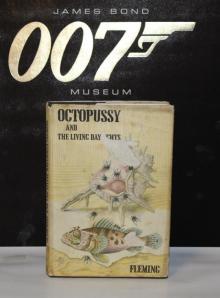 Octopussy & the Living Daylights
Octopussy & the Living Daylights On Her Majestys Secret Service
On Her Majestys Secret Service You Only Live Twice
You Only Live Twice From Russia With Love
From Russia With Love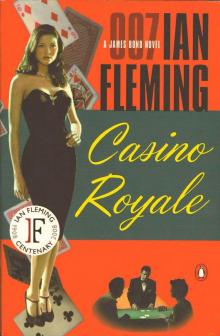 Casino Royale
Casino Royale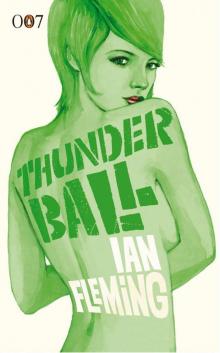 Thunderball
Thunderball For Your Eyes Only
For Your Eyes Only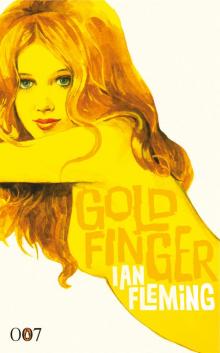 Goldfinger
Goldfinger The Man With the Golden Gun
The Man With the Golden Gun The Spy Who Loved Me
The Spy Who Loved Me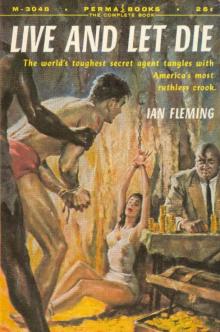 Live and Let Die
Live and Let Die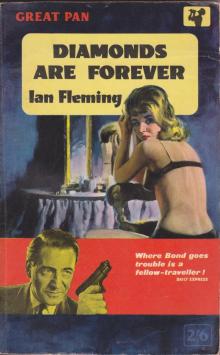 Diamonds Are Forever
Diamonds Are Forever Moonraker
Moonraker The James Bond MEGAPACK®
The James Bond MEGAPACK®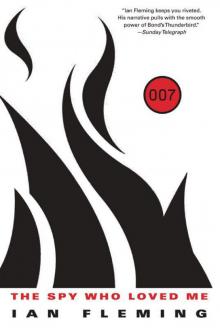 Bond 10 - The Spy Who Loved Me
Bond 10 - The Spy Who Loved Me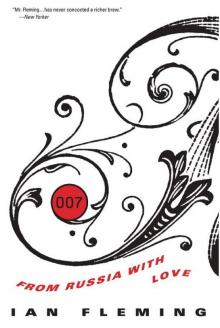 From Russia with Love (James Bond - Extended Series Book 5)
From Russia with Love (James Bond - Extended Series Book 5)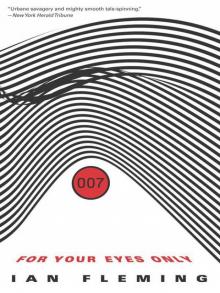 Bond 08 - For Your Eyes Only
Bond 08 - For Your Eyes Only Bond 14 - Octopussy and the Living Daylights
Bond 14 - Octopussy and the Living Daylights Bond 11 - On Her Majesty's Secret Service
Bond 11 - On Her Majesty's Secret Service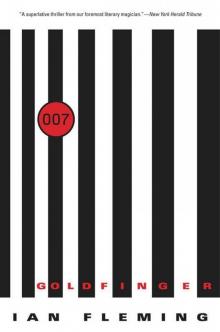 Bond 07 - Goldfinger
Bond 07 - Goldfinger Bond 12 - You Only Live Twice
Bond 12 - You Only Live Twice Bond 09 - Thunderball
Bond 09 - Thunderball Bond 01 - Casino Royale
Bond 01 - Casino Royale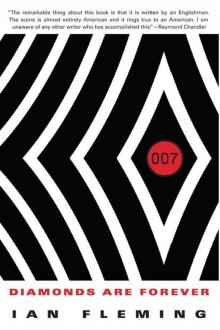 Diamonds are Forever (James Bond - Extended Series Book 4)
Diamonds are Forever (James Bond - Extended Series Book 4)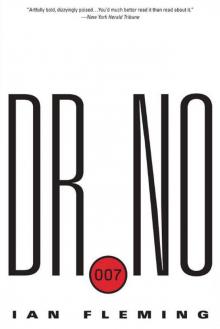 Bond 06 - Dr. No
Bond 06 - Dr. No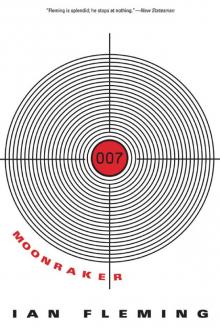 Moonraker (James Bond - Extended Series Book 3)
Moonraker (James Bond - Extended Series Book 3)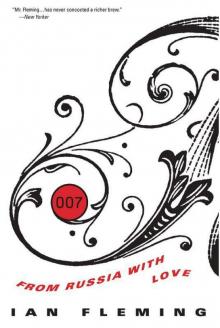 Bond 05 - From Russia With Love
Bond 05 - From Russia With Love Casino Royale (James Bond - Extended Series Book 1)
Casino Royale (James Bond - Extended Series Book 1)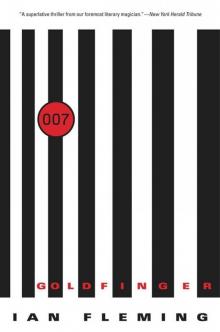 Goldfinger (James Bond - Extended Series Book 7)
Goldfinger (James Bond - Extended Series Book 7) Chitty Chitty Bang Bang: The Magical Car
Chitty Chitty Bang Bang: The Magical Car Bond 04 - Diamonds Are Forever
Bond 04 - Diamonds Are Forever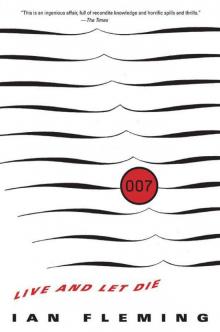 Bond 02 - Live and Let Die
Bond 02 - Live and Let Die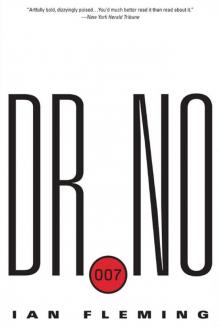 Dr. No (James Bond - Extended Series Book 6)
Dr. No (James Bond - Extended Series Book 6) The Hildebrandt rarity
The Hildebrandt rarity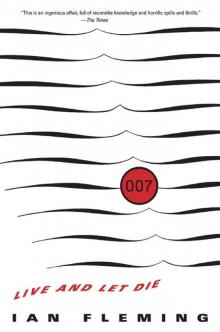 Live and Let Die (James Bond - Extended Series Book 2)
Live and Let Die (James Bond - Extended Series Book 2) Chitty Chitty Bang Bang
Chitty Chitty Bang Bang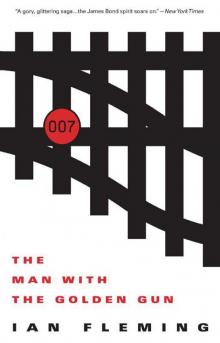 Bond 13 - The Man With the Golden Gun
Bond 13 - The Man With the Golden Gun Thrilling Cities
Thrilling Cities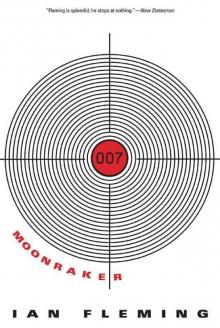 Bond 03 - Moonraker
Bond 03 - Moonraker